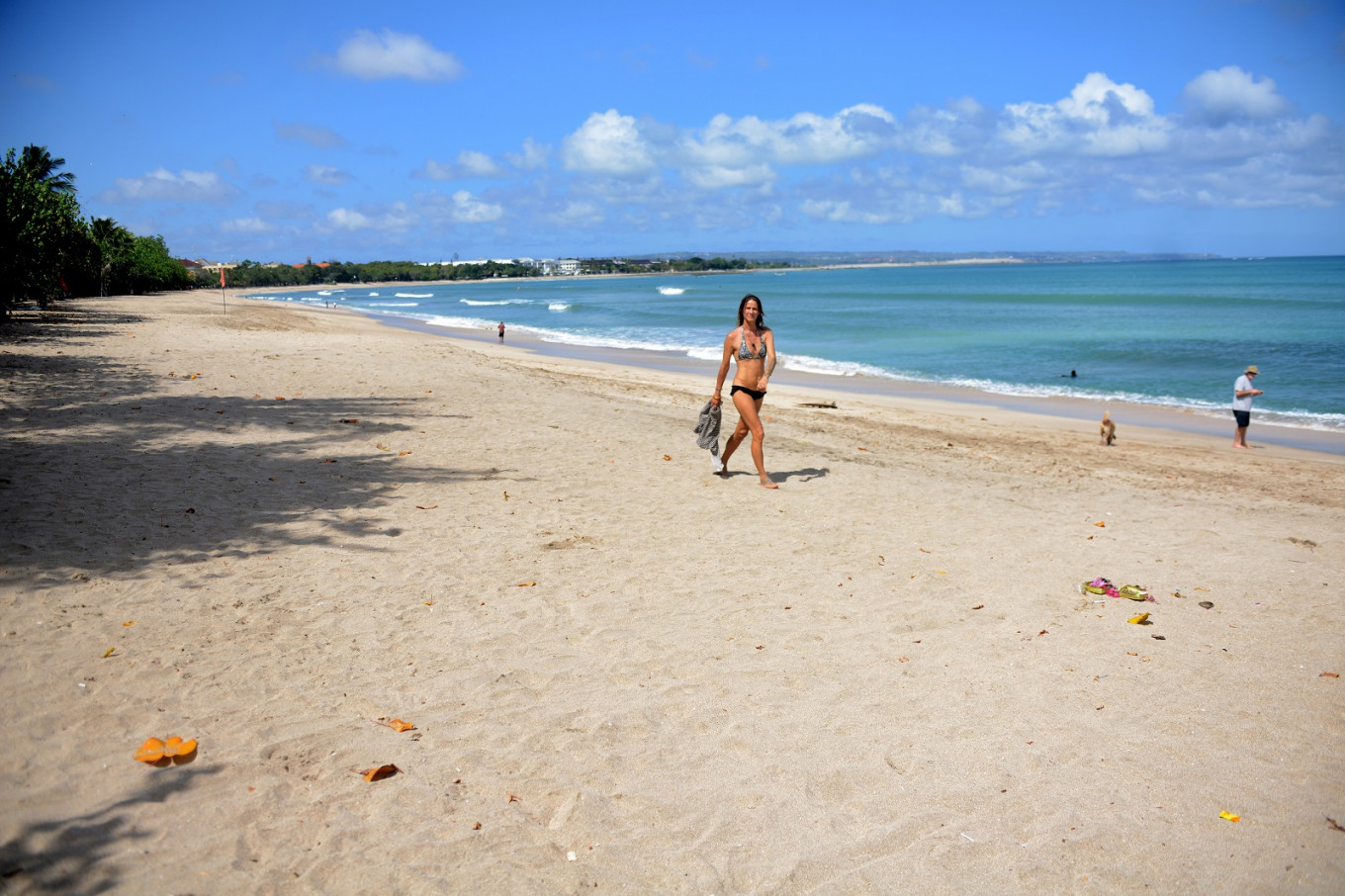Popular Reads
Top Results
Can't find what you're looking for?
View all search resultsPopular Reads
Top Results
Can't find what you're looking for?
View all search resultsTourism faces catch-22 as slow COVID-19 mitigation efforts persist: Experts
“We wasted time when we still had a chance. If we don’t want to make things worse, we must start adopting evidence-based reopening policy,” he said, adding that the government should only reopen regions that had a COVID-19 positivity rate of below 5 percent, in accordance with WHO advice.
Change text size
Gift Premium Articles
to Anyone
T
he nation’s tourist industry is facing a catch-22 as a rise in COVID-19 cases hampers its recovery, while strict closures will also severely impact businesses, experts and a business group have said.
Griffith University epidemiologist Dicky Budiman told The Jakarta Post on Monday that the slow government response during the initial outbreak of COVID-19 in Indonesia had created a prolonged economic effect, especially for tourism.
“Health experts had warned the government since early May to strengthen its pandemic mitigation effort by increasing the quality and quantity of testing capacity, to prevent further disruption on economic and social sectors,” he said in a phone interview.
However, even in late August, the country still lagged behind the recommended testing rate by the World Health Organization (WHO) of one test per 1,000 population per week, only meeting 35.6 percent of the agency’s testing rate target, the COVID-19 task force announced on Aug. 25. The country has recorded more than 196,000 cases as of Monday.
Dicky said the government’s decision to relax large-scale social restrictions (PSBB) for tourism was done prematurely and could add fuel to the fire. It should delay the reopening of vacation spots and apply PSBB in regions with high infection rates, he added.
“We wasted time when we still had a chance. If we don’t want to make things worse, we must start adopting evidence-based reopening policy,” he said, adding that the government should only reopen regions that had a COVID-19 positivity rate of below 5 percent, in accordance with WHO advice.
Tourism has been dealt a huge blow from the COVID-19 outbreak as people cancel travel plans due to social restrictions and international border closures. The pandemic has wiped out around Rp 85 trillion (US$5.9 billion) from Indonesia’s tourism revenue as of July, data from the Indonesian Hotel and Restaurant Association (PHRI) shows.
Regional administrations have since reopened some tourist spots, while Health Minister Terawan Agus Putranto issued a decree on health guidelines for tourist destinations and hotels, among others.
The country’s main attraction, Bali, also reopened on July 31. However, since then, cases in Bali have surged to 6,549 cases as of Tuesday, almost double from 3,407 confirmed cases on July 31, Bali government data show.
The WHO also stated in its situation report on Sept. 2 that the possible spike in infections was caused by increased mobility among the public in August.
“Epidemiologists have suggested that the recent surge in cases was caused by the two long weekends for Independence Day and Islamic New Year, which saw increased mobility among the public. They raised concerns that the spike in infections could lead to a crisis at health facilities and urged the government to take serious measures to control the transmission,” the report reads.
According to Health Ministry data on Monday, Indonesia’s positivity rate reached 13.9 percent, up from 13.5 percent on Sept. 1.
Read also: Indonesia’s COVID-19 testing positivity remains far above WHO standard for ‘new normal’
Meanwhile, Gadjah Mada University (UGM) tourism expert M. Baiquni told the Post that the industry could not afford another shutdown, as many hotels and travel agencies were already short on cash.
“The industry had the capacity to withstand three months without revenue back then. However, the industry has become so weak that it would be hard for it to face another closure,” he said.
Baiquni said the industry was facing a dilemma between the threat of a potential collapse if another closure occurred and a prolonged pandemic, which would also affect the industry.
“It is an extremely complex situation that we need to solve. All stakeholders need to work together to save the industry and develop a new tourism model,” he said.
PHRI chairman Hariyadi Sukamdani echoed Baiquni’s statement, saying that the rising number of cases had cause the public at large to become reluctant to go on vacation or hold events despite the industry’s effort to reassure the public of facility safety.
“We have been following strict health protocols, including limiting the number of people at a venue. However, it’s hard to attract customers if the [infection rate] keeps rising,” he said.
While hotels in popular vacation spots such as Yogyakarta and West Java’s capital of Bandung have seen their occupancy rate rise to around 60 percent during long holidays in August, other tourism regions such as Bali continue to suffer from low occupancy rates, according to Hariyadi.
The PHRI also warned that another closure to avoid COVID-19 transmission would create a detrimental effect on the industry and the general economy amid the possibility of layoffs.
“All of this happened because we were not serious at the beginning [of the pandemic]. If we handled it better earlier, maybe all of this would not have happened,” he said.










